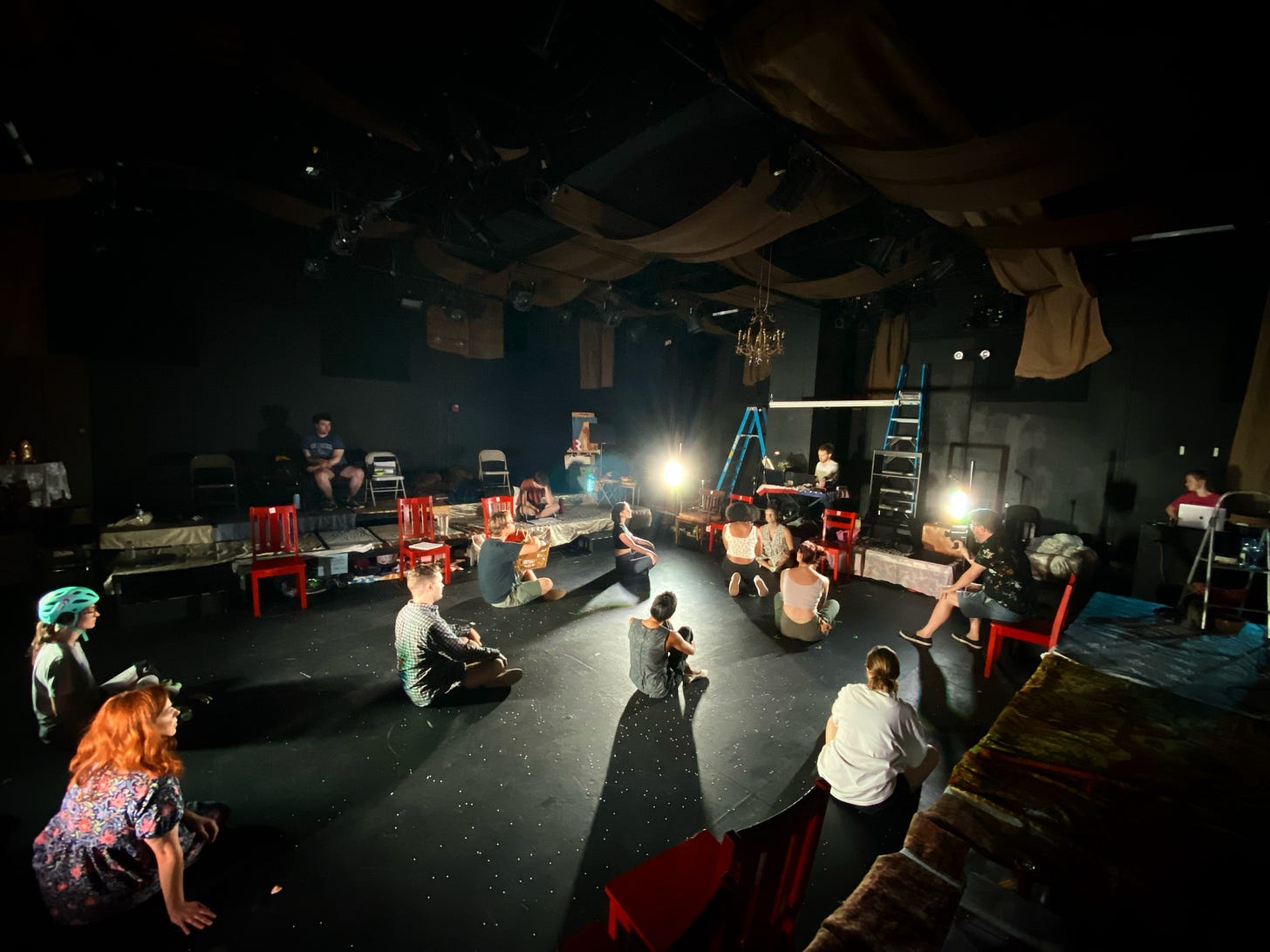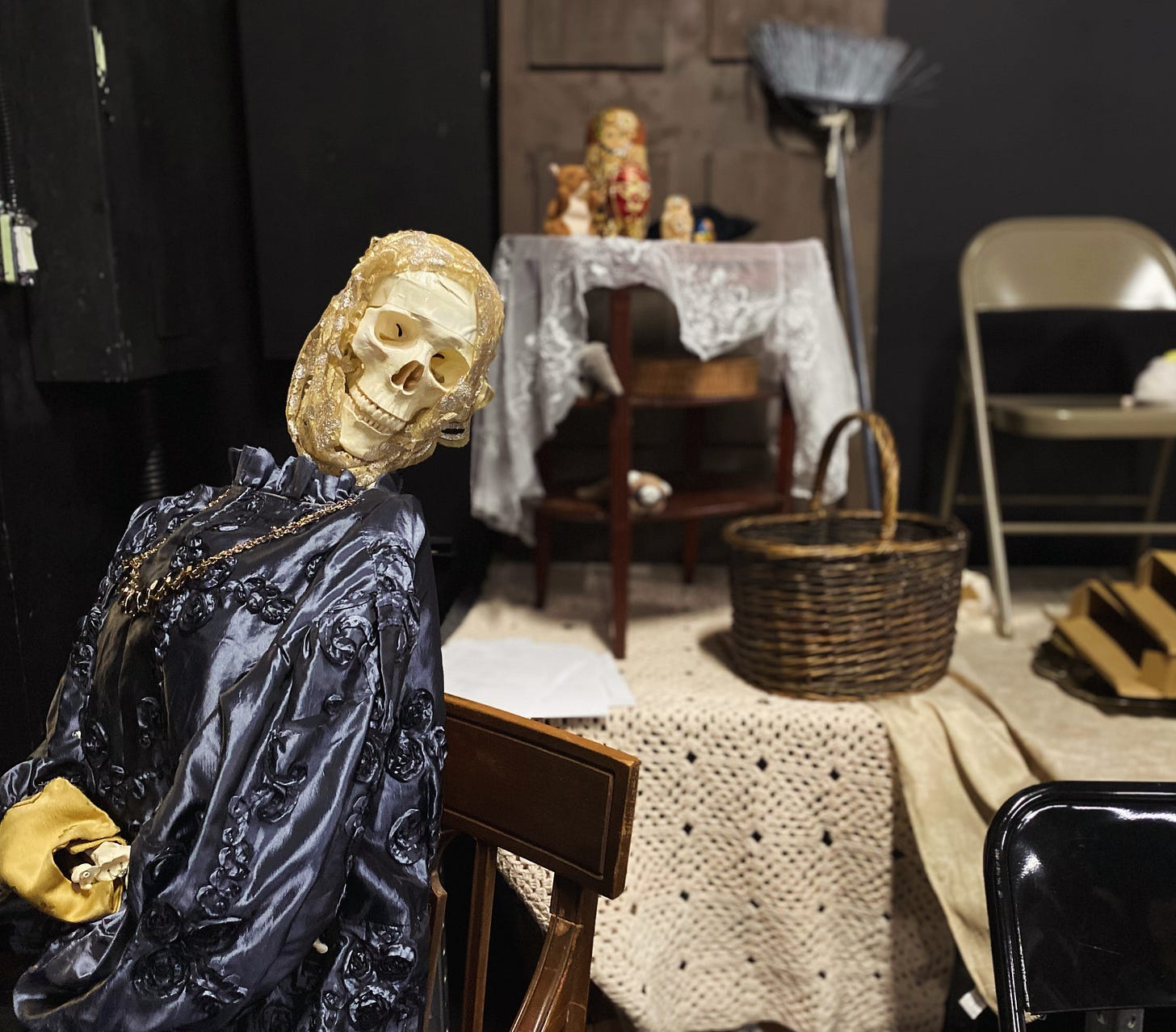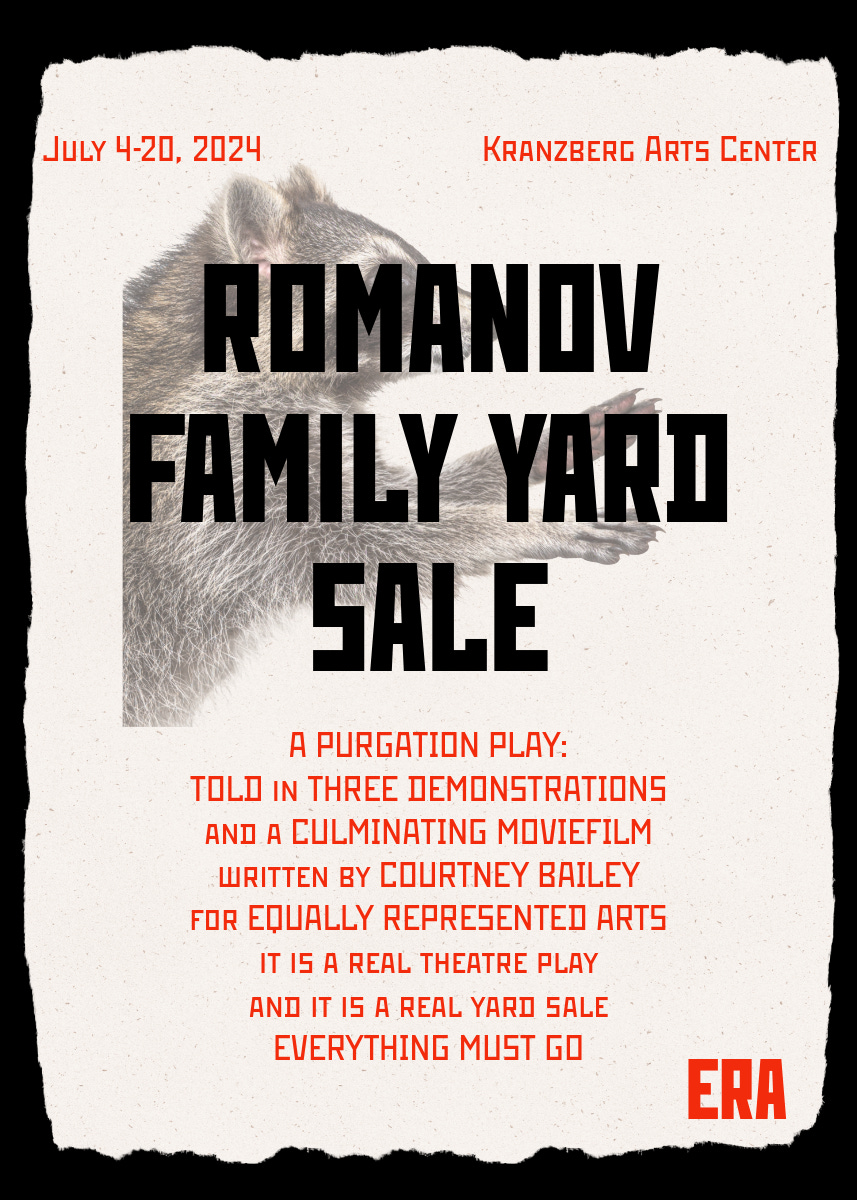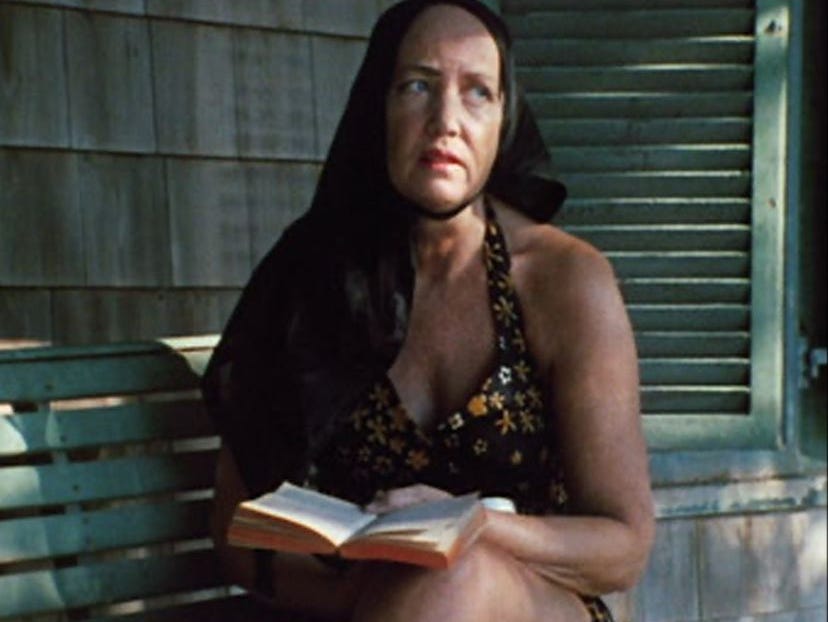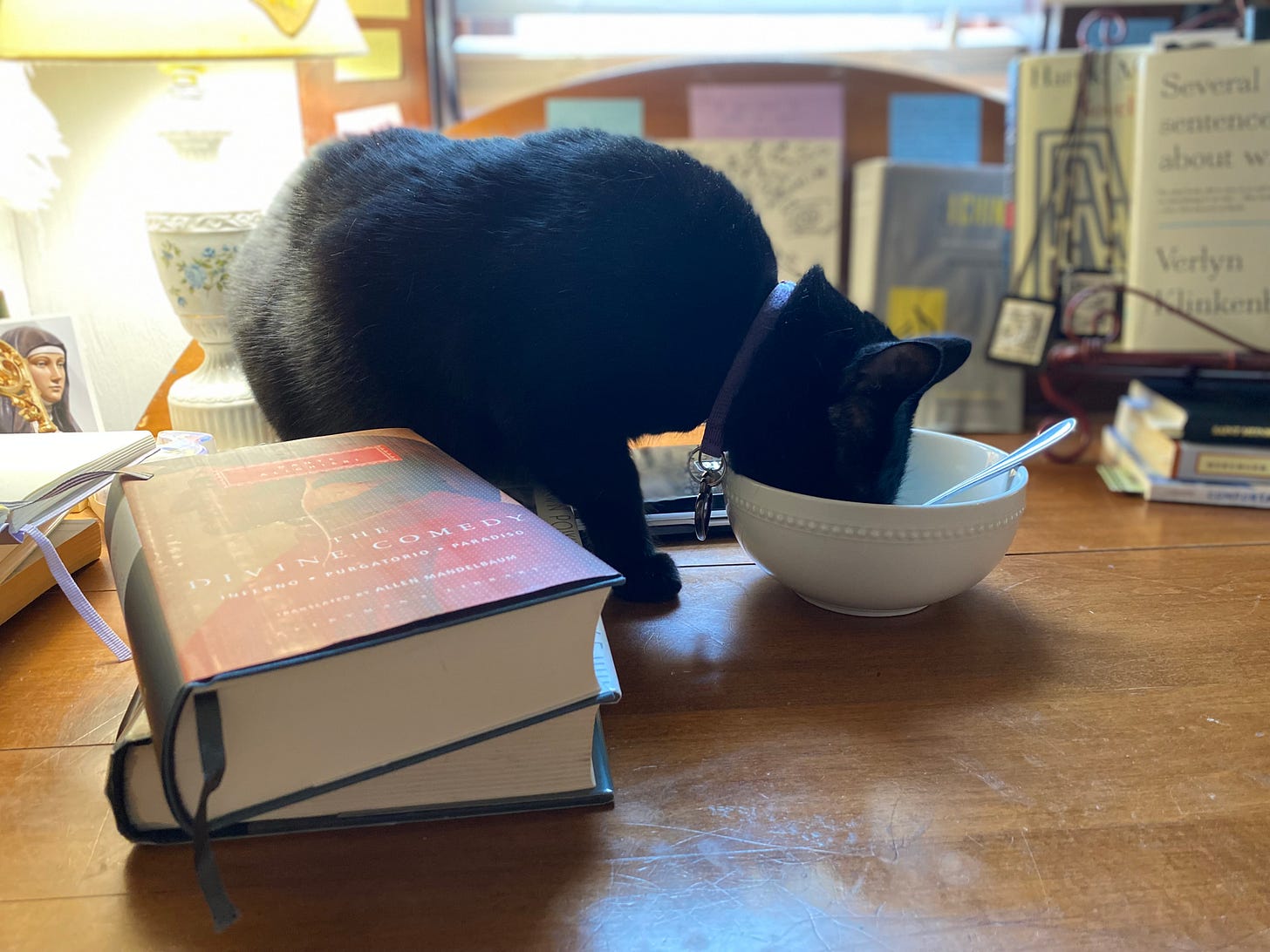Purgation as an antidote to rage.
Here is a Letter from the Homestead for June 2024 ✍️. What's inside: anger, a yard sale play, and what I've been reading this month.
Emily Dickinson called her Amherst home “The Homestead.” I lovingly call my apartment in St. Louis the same thing (although I definitely get out more than Dickinson). This monthly newsletter is my attempt to work through what it feels like to put down roots as a writer in my own Homestead.
Purgation: an unexpected antidote to rage (and the driving force of Romanov Family Yard Sale)
I’ve lived the past several years trying to be cool as a cucumber. In 2019, my life changed dramatically, a complete reversal of the narrative stream I’d been swimming along since finishing college ten years earlier. I left a marriage. I left a career. I took it all in stride, convinced that a good attitude would carry me past the boundaries of rage.
Then I spent two straight weeks in April listening to Taylor Swift’s The Tortured Poets Department and I lost it. Anger crept up on me like panther. My loving-kindness for any past wrongs withered up, and I went several days trying to just relax my jaw after clenching it so hard. I never allowed myself to be angry in the midst of all that upheaval. But the anger was here now.
When I teach my writing classes, I try to remind students that “anger is generally preceded by pain.” I really believe this; anger is a secondary emotion, one that follows the pain of embarrassment, betrayal, grief, or physical injury. I also stress to students that “we do not write to settle scores”—in other words, we don’t write to punish people.
My recent rage makes me question that advice.
I’d like to settle some scores—with myself and with others.
In January of this year, I finally sat down to write Romanov Family Yard Sale, my new play about the distant relatives of the Romanov dynasty selling off all their stuff. I subtitled it a purgation play. At first, I thought of the subtitle only in terms of the logistics: a yard sale, after all, is a purgation, a la Marie Kondo’s extreme “tidying up.”
The more I’ve sat with this play and watched the actors in rehearsal, the more I see how my subconscious inserted this “yard sale purgation” idea without me understanding its real significance. I needed to let go of a lot of things, and it took a period of rage (Why did I get married so young? Did I let myself get manipulated? How did I live so long with so much anxiety?) to make me ready to purge. In the end, the purgation has settled my nerves—an unexpected antidote. Has it settled scores? Not entirely, but it’s getting there.
I boxed up stuff that’s been in a closet for over four years, left behind by an ex. Why did I keep it for so long, letting it occupy some much-needed storage space? Honestly, the true answer is something like this: I worried he’d be angry at me if I got rid of it. Of course, this ignores the obvious fact that he left it behind anyway. He didn’t want it in the first place! By leaving it behind, he saved himself a trip to the dumpster! Still, I worried—wouldn’t this make him angry?
It’s remarkable how the phantoms of past loves make us hold on to things with imaginary chains.
While loading in for the yard sale play, I took an entire carload of stuff to the theatre. All of those things belonged to a previous version of myself. I didn’t want them anymore, but they were too familiar to throw away. A yard sale felt like a good middle-way to send them off to Nowhere Land.
“Purgation” is the right word for the work of a yard sale, I think. You acknowledge that the things you’ve carried cannot just be thrown away or blindly donated. No, they must be sorted, inventoried, priced, and well-presented— for purgation does not work without mindfulness.
Highlights from a yard sale play-process.
Aside from all the latent anger Romanov Family Yard Sale dredged up, I wanted to take time to record some highlights from the rehearsal process for this weird play. I knew a year out that this play would be produced by ERA, long before I’d written a single line, so I had some time to scratch for ideas and plan the structure of the play slowly. No play is “easy” to write, but I felt prepared to write this one. The writing period itself was about 3 months. The rehearsal process, on the other hand, is only about 4-5 weeks. It goes by so fast.
Here are a few moments I want to remember from this play process:
Watching the actors unfurl a parachute (a prop in the show) for the first time and play with it in the theatre
Realizing I’ve made something my family will love
Seeing my friends accept the weird circumstances of the play
Feeling confident in the quality of the script— I know I did my job by building something solid
Watching my friends do incredible performance work without blinking an eye
Making something truly collaborative— lots of cooks in the kitchen, but everyone trusts the recipe
Feeling goosebumps when I realize a moment works
Moving my body during load-in/tech and not feeling like a sedentary writer
Understanding that I’m getting better with each play I write
The more plays I write, the more I see that my chief reason for writing is create excuses for my friends and me to all get together and make something wonderful. The great gift of playwriting is community. I will never understand playwrights who don’t enjoy being present for the rehearsal period of their new plays (do these playwrights even exist?). I stay in my lane in rehearsals, but simply watching a rehearsal process gives you incredible data on what works and what doesn’t. I’m a better writer for showing up to the process, if only to observe.
What I’m Reading this Month…
The Divine Comedy by Dante. I made it through a whole literature PhD without reading The Divine Comedy. I’m trying to correct that omission now. It’s surprisingly accessible— I’m using the Everyman’s Library edition, and the translation is smooth and readable. Very easy to read a canto or two each night before bed.
The Diaries of Dawn Powell, 1931-1965. I’ve never read any books or plays by Dawn Powell, but I’m deeply enjoying her diaries. They are mostly focused on her writing life, which I appreciate. Financial worries, stress over relationships and how they affect projects, and gripes about the industry— these diaries cover it all.
On Death and Dying: What the Dying have to Teach Doctors, Nurses, Clergy, and Their Own Families by Elisabeth Kübler-Ross. I’m fiddling around with a play idea about Emily Dickinson, a poet who had a wild fascination with death and dying. This book is part of the research.
Little Women by Louisa May Alcott. I’m in the early stages of a play draft for a Missouri Women’s prison— a creative adaptation of Little Women. I’ve been listening to the audiobook version of the novel, which has helped me keep from skimming the parts I already know very well.
How I made money this month $$$
I believe freelance artists should be more upfront about how they support themselves financially, rather than maintaining the illusion that they are fully supported by their art (they usually aren’t). This is me attempting to live out that principle. So, here are all the ways I brought in money to the Homestead for the month of June.
Teaching artist work for Prison Performing Arts. Teaching a weekly writing workshop on Zoom and teaching Spoken Word regularly inside a men’s prison.
Play commission fee. Was paid for a short play commission.
Paid Substack subscriptions. Thank you to all of my paid subscribers. It means the world to me that you make a financial contribution to my work.
Have complicated feelings about Independence Day given all that’s happening in the world? Come to a yard sale play!
Midge the Cat wants you to know that you can find an alternative celebration to the Fourth of July in Romanov Family Yard Sale. 🇺🇸
It is indeed a real theatre play and a real yard sale. You’ll be able to shop the yard sale before the show and during intermission. St. Louis friends, please come!
Tonight starts a new month.
Thank you, as always, for reading.
Courtney, Mistress of the Homestead, and Noble Midge the Cat 🐈⬛






